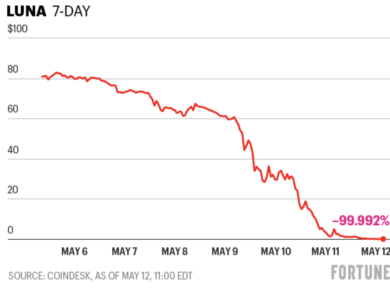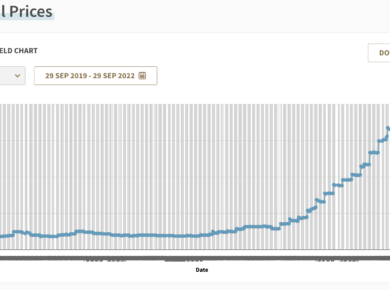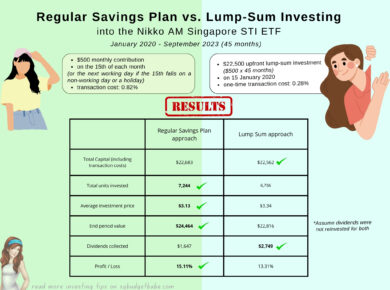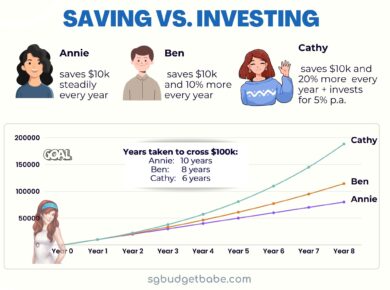I haven't checked the stock market in about 2 weeks. At festive / busy seasons like these, I'm always reminded of how important it is for me to remain an investor and not an active trader.
What's the difference?
Traders tend to adopt more technical methods as their stock market strategy. They'll use charting techniques, study candlestick patterns, and try to predict where the prices will go next in order to make their money. They also hold on to their stocks for a shorter period of time.
Traders need to check the stock market very very often or they'll miss out on price opportunities. Decisions can be made in snap moments. Which is why you hear of folks being "full-time traders", but fewer being "full-time investors".
Investors, on the other hand, tend to have a longer time horizon. Unless you're Warren Buffett or working in a fund, it is unlikely that you'll get to spend that much time researching on an investment.
But of course, there's plenty of debate over both terms.

Even in my circle of friends who are financial bloggers, there's plenty of debate over what constitutes a trader vs an investor. I won't go into this, since the responses can be quite extreme.
But to me, I'm always reminded of how I'm more suited to be an investor rather than a trader. My day job already takes up 9am – 6pm of my weekdays; after work, I'm either at dance / teaching tuition / meeting friends. I try to also squeeze in blogging and reading in between whenever I can.
So it takes me a really long time to research a stock before I take up a position. And when I buy, I don't have the luxury of time to keep checking in on the stock market to see where the prices are moving. I try to check in at least once every week, or once every month for some of my longer-term positions. #dayrefinance #dayresavings #dayreinvest
"Price is what you see, value is what you get".
Let's imagine that you bought $10k of company XYZ stock at $3.80 each.You liked their business as one of the only three telco providers in the country with a high historical dividend yield. Also, since telco services are technically recession-proof (don't people still have to use it regardless?) it would also be a relatively safe investment.
A year later, there's rumours that the government plans to introduce a fourth provider to disrupt the oligopolistic market. The stock price drops to $3.50.
It is a good company! With more people consuming more data, the telcos will benefit, then I can benefit as well as a shareholder!
A few months later, the government announces in the news that talks about an impending fourth telco are real, and that they'll open the bid soon.
Company XYZ's stock price now drops continuously for months until it reaches $3.30.
You're now sitting on $1.3k of losses. Will you sell?
You're panicking because $1300 is quite a sizeable sum, and could easily have paid for a good holiday to Taiwan for a week.
Before you manage to make your decision, however, the stock price starts recovering and climbs a little to $3.45.
You're a little relieved, because now your losses aren't as bad anymore, and you decide to wait it out.
6 months later, the government announces that the bid has been won and the license awarded to a fourth telco.
Your stock price now drops to $2.80.

More and more bad news!!
You're kicking yourself now because your losses have grown to $2.6k.
"I should have sold when I had the chance! Now I've lost EVEN MORE MONEY!"
You tell yourself, since the fourth telco is confirmed, they'll come in and take away a significant market share. Company XYZ will then face falling revenue. You'd better get out of the stock market now before the stock price drops any further and you lose even more money.
So you sell, albeit reluctantly, and take back $7.4k of what was originally $10,000.
You delete the stock from your SGX watchlist, cursing the company, and blaming yourself for not having cut your losses when you had a chance to sell at $3.45.
"That was God giving me a sign and a chance to sell! Urgh."
Life goes on.
2 years later, it turns out that the fourth telco has been facing a lot of issues in winning over customers. The 3 incumbent telcos, including company XYZ, had rolled out attractive incentives to retain their customers and prevent them from jumping ships.
The fourth telco is now unable to keep up with the competition as they've been bleeding cash for 2 years, which is more than enough losses for them. They decide to pull out of the market.
The stock prices of the original 3 telcos suddenly rise. Company XYZ shoots back up to a new record high of $4.20.
?!$&/?@$&!!!!!!!!
If you've not done anything, your $10k would have grown to $11k by now. But because you acted, you lost $2.6k instead.
Now, let's go back to square 1 and imagine what would have happened if you hadn't checked the stock prices actively and simply held onto the stock.
Even while the prices were falling, for as long as you didn't sell your stock, your losses were only paper losses. Furthermore, you continued to receive dividend payments during your holding period.
Company XYZ cut their 6% dividend yield to 4% during this time, but once the fourth telco had been kicked out and peace restored, it went back to 6%.
At the end of the 3 years, you would have had $1800 sitting in your bank from dividends, and an additional $1000 in paper gains on the stock market.
Some of you might be sharp enough to know which company is XYZ. (And no, I didn't invest in them, but had watched them during that entire stock price period I just described above). Obviously, we don't know yet if the fourth telco will do well, so the ending section is all fiction.
But it is a very typical scenario. Replace the industry with another type or perhaps the country, and you'll find similar investing stories in history and around the world.
What's your story? Scenario 1 or 2?
#bbinvestments
I hope this story gives you guys an insight into how price and emotions come into play.
I'm not advocating buy and hold (forever) all the time. But if you've an active social life and other responsibilities outside of the stock market, trading may not be quite as suitable for you. I realised this myself over the course of 2016.
Many ads talk about how much money you can make. Fewer talk about the time and effort required, and hardly anyone talks about losses.
But these are all part of the investing journey.
Will share more during the Dayre Meetup on 30 Dec! Excited to see all of you!
If you've any questions that you'll like me to touch on during the session, feel free to let me know!!






